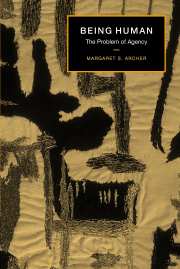Book contents
- Frontmatter
- Contents
- List of figures
- Acknowledgements
- Introduction
- Part I The impoverishment of humanity
- 1 Resisting the dissolution of humanity
- 2 Modernity's man
- 3 Society's being: humanity as the gift of society
- Part II The emergence of self-consciousness
- Part III The emergence of personal identity
- Part IV The emergence of social identity
- Conclusion: the re-emergence of humanity
- Index
1 - Resisting the dissolution of humanity
Published online by Cambridge University Press: 22 September 2009
- Frontmatter
- Contents
- List of figures
- Acknowledgements
- Introduction
- Part I The impoverishment of humanity
- 1 Resisting the dissolution of humanity
- 2 Modernity's man
- 3 Society's being: humanity as the gift of society
- Part II The emergence of self-consciousness
- Part III The emergence of personal identity
- Part IV The emergence of social identity
- Conclusion: the re-emergence of humanity
- Index
Summary
Humanity is seen as the linchpin of agency in general and is therefore crucial to how one side of the ‘problem of structure and agency’ is conceptualised. Too often we are presented with reductionist accounts, which either make all that we are the gift of society or, conversely, which claim that all society is can be derived from what we are. Instead, both humanity and society have their own sui generis properties and powers, which makes their interplay the central issue of social theory for all time. This book is concerned with the emergence of our human properties and powers. They are relational: stemming from the way our species is constituted, the way the world is and the necessity of their mutual interaction. The relations between the two, being universal, supply the anchor which moors our elaborated human forms as Selves, Persons, Agents and Actors, and thus sets limits to their variability. Humanity, as a natural kind, defies transmutation into another and different kind. It is this which sustains the thread of intelligibility between people of different times and places, and without it the thread would break. It is this too which underpins our moral and political responsibilities to humankind despite the socio-cultural differences of groups – for these are never big enough for them to leave the human family and dispense us from our obligations to family members.
- Type
- Chapter
- Information
- Being HumanThe Problem of Agency, pp. 17 - 50Publisher: Cambridge University PressPrint publication year: 2000



